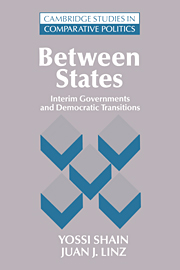Book contents
- Frontmatter
- Contents
- Preface
- Contributors
- PART ONE THEORY
- PART TWO CASE STUDIES
- 7 The provisional government and the transition from monarchy to Islamic republic in Iran
- 8 From revolution to democracy in Portugal: The roles and stages of the provisional governments
- 9 Accelerating collapse: The East German road from liberalization to power-sharing and its legacy
- 10 Interim government and democratic consolidation: Argentina in comparative perspective
- 11 The failure of an internationally sponsored interim government in Afghanistan
- 12 Electoral transitions in Yugoslavia
- 13 Democratization and the international system: The foreign policies of interim governments
- Index
10 - Interim government and democratic consolidation: Argentina in comparative perspective
Published online by Cambridge University Press: 05 August 2012
- Frontmatter
- Contents
- Preface
- Contributors
- PART ONE THEORY
- PART TWO CASE STUDIES
- 7 The provisional government and the transition from monarchy to Islamic republic in Iran
- 8 From revolution to democracy in Portugal: The roles and stages of the provisional governments
- 9 Accelerating collapse: The East German road from liberalization to power-sharing and its legacy
- 10 Interim government and democratic consolidation: Argentina in comparative perspective
- 11 The failure of an internationally sponsored interim government in Afghanistan
- 12 Electoral transitions in Yugoslavia
- 13 Democratization and the international system: The foreign policies of interim governments
- Index
Summary
INTRODUCTION
In July 1982, a few weeks after Argentina's defeat in the Falklands/Malvinas conflict, the most repressive military government in Argentine history announced that elections leading to civilian rule would be held at an unspecified date no later than the end of 1983. For the next seventeen months, General Reynaldo Bignone's incumbent caretaker administration governed the country. This chapter examines the emergence, decisions, and impact of Bignone's caretaker government in the broader context of the Argentine transition from authoritarian rule. By comparing this interim government and transition to others in Latin America and Southern Europe, it will be possible to illuminate how, and to what extent, Argentina's interim government and transition shaped the quality and stability of its emergent democracy.
A transition from authoritarian rule is not always a transition to a consolidated democracy. The emergent regime may be a new kind of authoritarianism (e.g., Iran 1979) or a regime that falls short of full democracy (e.g., Brazil 1985). Even if a democracy emerges, it may not last. A brief democratic interlude may be terminated by a new military coup (e.g., Venezuela 1948), an elected leader who destroys the regime from within (e.g., Germany 1933), or a popular insurrection (no historical examples). These alternative outcomes suggest that emergent democratic regimes may vary along two dimensions: quality and stability. To evaluate the quality and stability of the democracy that emerges from a transition, democracy must be defined in a way that can be applied to actual regimes.
- Type
- Chapter
- Information
- Between StatesInterim Governments in Democratic Transitions, pp. 179 - 210Publisher: Cambridge University PressPrint publication year: 1995
- 17
- Cited by



